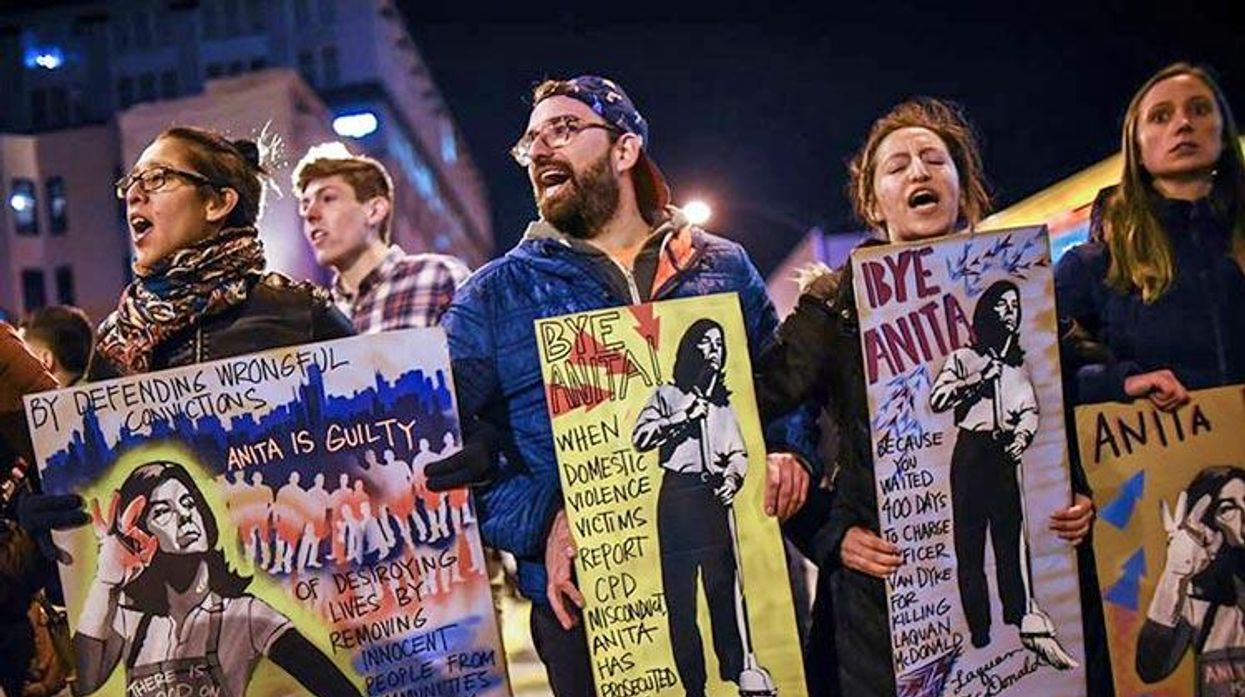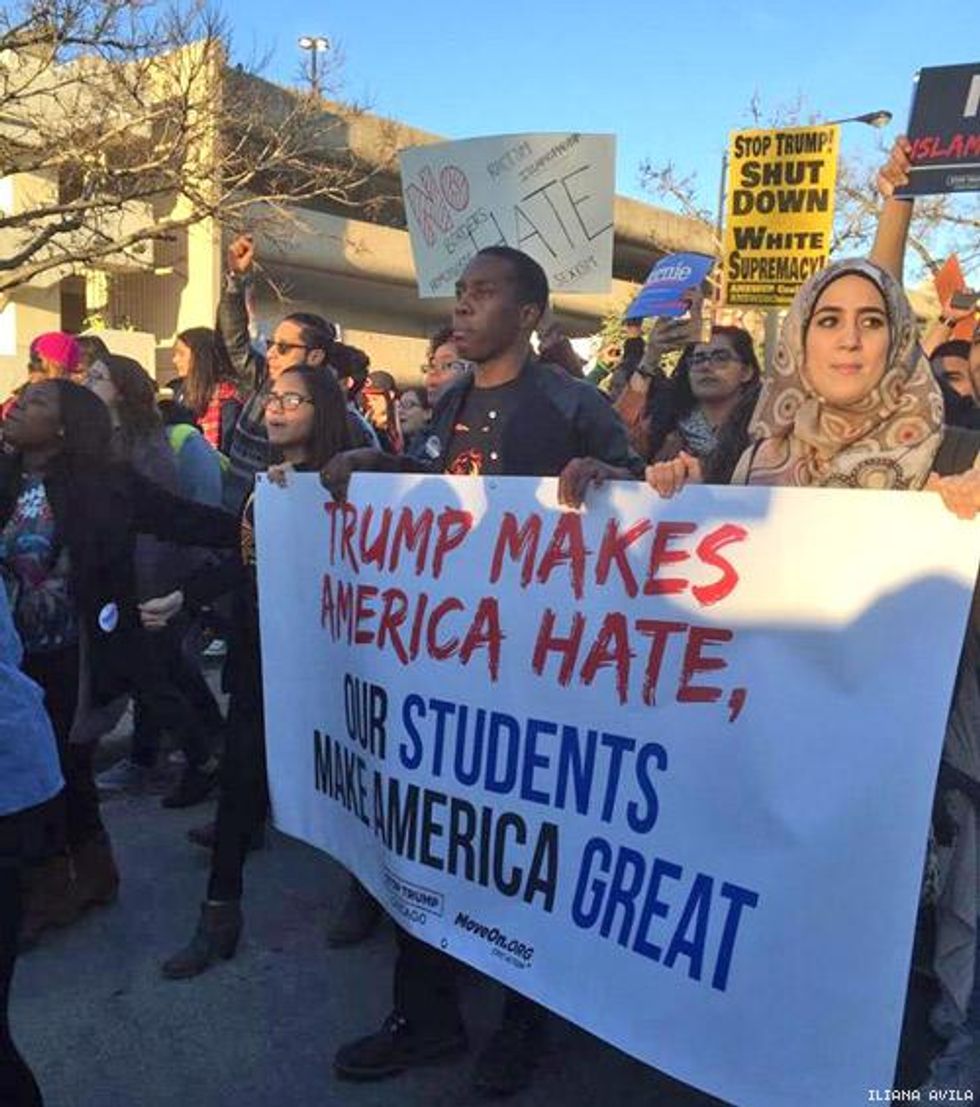Students and faculty at the University of Illinois at Chicago had exactly one week to organize against Donald Trump.
By the time Trump arrived at the UIC Pavilion March 11, activists had not only shut down Trump's rally with direct action both in and outside the venue, they had demonstrated a powerful way to clap back at the Republican front-runner and his supporters' proud intolerance.
It's a tactic that's been repeated -- and its propriety much debated -- at subsequent Trump rallies in Arizona and Washington, D.C.
As soon as he heard that Trump was scheduled to speak at his Chicago campus, 27-year-old Jorge Mena knew he had to act.
"I don't want Trump to be in the same place where I study and where I work," Mena recalls thinking. "But I also don't want him to be in the same place where I'm going to graduate in a few months. I think just the idea of him there, and Trump supporters being on my campus ... made me uncomfortable, but also made me feel unsafe."
Mena is an undocumented queer graduate student who also works as a teacher's aide at the Chicago campus. He worked closely with a broad coalition of progressive groups to organize against Trump, and authored a petition with Latino and Chicano organizing group Mijente at MoveOn.org that garnered more than 51,000 signatures calling on the university to cancel Trump's event.
"Donald Trump is running on a platform of hate and dangerous intolerance," read the petition. "It has no place in Chicago but especially not at an institution of higher learning. ... UIC should not be host to hate. Please cancel the event."
University officials declined to cancel the event, pointing to the school's "standard practice for decades to rent available space on campus to any political candidate when requested." Hosting Trump was not an endorsement of his campaign or values, said UIC Chancellor Michael D. Amiridis in a statement on March 5. Amiridis continued:
"UIC's core values of freedom, equality and social justice for all, regardless of race, religion, national origin, disability status or sexual orientation, are deeply rooted in our diverse community and not endangered by the presence of any political candidate on campus. We encourage public and civic engagement by all members of our University and we endorse the idea that the answer to speech that one does not like or finds offensive is more speech and not censorship.
"We welcome the diverse sentiments expressed by our students, faculty, staff, alumni and the neighboring communities regarding the upcoming political event. And we want to ensure everyone that security plans are in place to address the safety of our campus community during this event."
That didn't sit well with Mena and his fellow organizers, which included other students, roughly 300 faculty who authored a letter of concern, and progressive groups throughout Chicago, including Assata's Daughters, which describes itself as a "grassroots, intergenerational collective of radical black women located in the city of Chicago who love and support each other."
The university's response -- specifically the promise of increased security and local police presence -- felt like a slap in the face, Mena tells The Advocate.
"That's not going to make us feel safe," says Mena of the university's promise to enlist officers with the Chicago Police Department and Secret Service. "Because we know that CPD doesn't have a good track record. And we've seen the violence CPD has had, picking up Laquan McDonald and different cases of that in America."
So protesters started planning ways to infiltrate the Trump rally, with the express intent of shutting it down. They knew they could well be stepping into the mouth of the beast, Mena acknowledges. With viral videos showing Trump supporters sucker-punching anti-Trump demonstrators, and the candidate's own unapologetic goading of his supporters to violence, the diverse group of activists from across the city braced themselves for the worst.
"We realized that Trump rallies are really a place for hate groups to amass or come together, and be violent," says Mena. "And I think there was some hesitation, but I think we knew that we had to show up and show our numbers."
And show up they did. Politico reports that an estimated 2,500 anti-Trump demonstrators gathered outside the UIC Pavilion on the evening of March 11 -- Mena was among them -- while hundreds more filed into the venue.
"The protesters, mostly black and Latino and young, were standing shoulder to shoulder with the people that their protest would upset most," reported Politico's Keith O'Brien, who was inside the UIC Pavillion. "The crowd was white -- all of them -- sporting 'Hillary for Prison' and 'Bomb the Hell out of ISIS' pins, wearing camouflage ball caps, hunter orange, and N.R.A. gear, and shouting for their candidate, who was late, but coming, surely coming."
When that candidate didn't show and instead canceled the event, his supporters turned their frustration on the predominantly young people of color who were vocally celebrating the untimely end of the rally.
In the wake of the cancellation, the violent clashes that arose -- which Mena and university professors contend were initiated by Trump supporters -- have been well-documented.
Trump himself promptly took to Twitter to claim that his "freedom of speech" was being restricted by "thugs," though Mena and other advocates have noted that Trump voluntarily canceled the demonstration. The Chicago Police Department has said it did not order the rally's cancellation and in fact was not consulted about the abrupt decision to nix Trump's scheduled appearance.
"Trump knows how to incite fear in people," Mena says. "And I think he knows how to push his anti-immigrant, anti-Latino, anti-Muslim, anti-black rhetoric, so that people feel like they can be violent toward others. People who are reading Trump's statements should really question where it's coming from, at its core ... [because] I think it's coming from a very hateful, racist place, that's encouraging violence."

While confrontations inside the UIC Pavilion garnered significant media coverage, the sizable collection of anti-Trump demonstrators outside the venue tied their actions to local issues. Specifically, protesters drew attention to the Cook County State's Attorney election, calling for the ouster of Anita Alvarez, a longtime prosecutor who came under intense scrutiny for her handling of the fatal CPD officer-involved shooting of 17-year-old Laquan McDonald. Demonstrators carried signs reading "Bye, Anita" and urging Chicago residents to vote her out of office in the March 15 primary.
"People were trying to connect the issues and trying to make people understand that being politically engaged should also be happening at a local level," explains Mena of the multifaceted demonstration. "I think we see how Trump is taking so much attention, and these presidential campaigns take so much attention away from local issues. ... We really wanted to bring attention to how she needed to be pushed out because of all the violence that she's supported by not convicting police officers who clearly should have been convicted, etcetera."
Speaking to The Advocate by phone March 16, Mena gleefully reported that Alvarez had indeed lost that primary election to challenger Kim Foxx. He points to the demonstration outside the Trump rally -- including a "soft blockade" that saw Mena and other protesters link arms and block traffic over the 290 West Expressway, as Trump supporters attempted to leave the venue by car -- as a crucial piece of the information dissemination that helped voters oust Alvarez. Several people were arrested during that portion of the demonstration, Mena says.
Despite the arrests and reports of violence both inside and outside Trump's Chicago rally, Mena is confident that he and fellow organizers did the right thing. They challenged hate where they saw it, he argues. Mena is aware of some criticism that contends those wanting to agitate for change and tolerance should do so in a less aggressive, more peaceful manner, but he feels the stakes are too high at this point.
"I think there is no other way to do it," says Mena when asked if organizers considered a less confrontational form of protest. "I think that's the way that we can use our voices and be politically engaged. I myself, as an undocumented person, may not have the right to vote, but I can make sure that I'm still politically engaged by protesting."
Because when a leading candidate for president advocates immediately deporting 11 million people, issuing a blanket ban on U.S. entry by an entire faith practice that includes more than 1.6 billion people, and consistently characterizes women and people of color as "stupid" "losers," the political becomes personal.
"I'm one of the 11 million people [Trump] wants to immediately deport," says Mena, explaining that he benefitted from President Obama's expanded deferred action work permits for people brought to the U.S. as children. "Every time Trump gets on stage, he's targeting me, he's hurting my family. ... We have to make our voices heard now. There is no time to wait for a space at the table, or to wait silently or quietly for our turn -- because we know that it's our duty to make our turn and take our place at the table."






































































Charlie Kirk DID say stoning gay people was the 'perfect law' — and these other heinous quotes